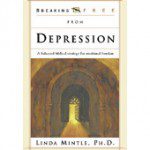 Could it be that depression is an obvious symptom of deeper problems within the physical body?
Could it be that depression is an obvious symptom of deeper problems within the physical body?
Researchers are asking this question as they look at stress and depression in new ways.
Long-term depression, it appears, changes chromosomes the same way that aging does! So researchers are study the cellular changes of people who have suffered long-term depression.
This look at cellular changes is important because long-term depression seems to bring on more serious forms of physical illness that are often seen in older people (e.g., dementia, stroke, heart disease, osteoporosis, etc). The phenomena is known as “accelerated aging” and is now being studied at Duke University, University of California, San Francisco (UCSF) and other academic institutions.
The idea is that as we age, the end of our chromosomes (called “telomeres”) shrink. Research suggests that depression also shrinks this part of the chromosome. In other words, depression makes the cells age prematurely, putting people at risk for diseases usually associated with aging.
Important questions are: 1) How much of a person’s life experience versus genetics is involved in age-related diseases? 2) Can the physical impact of depression be reversed? 3) Why do some people do worse than others when it comes to physical problems and depression? 4) Are there factors that protect certain people?
One study at UCSF found the personality trait of pessimism related to changes at the cellular level.
Now before you become more stressed thinking about the damage you could be doing to your physical body if you are depressed, researchers believe it takes years for these physical changes to occur.
So get help now in order to prevent more physical problems later. And be optimistic, depression is treatable!


